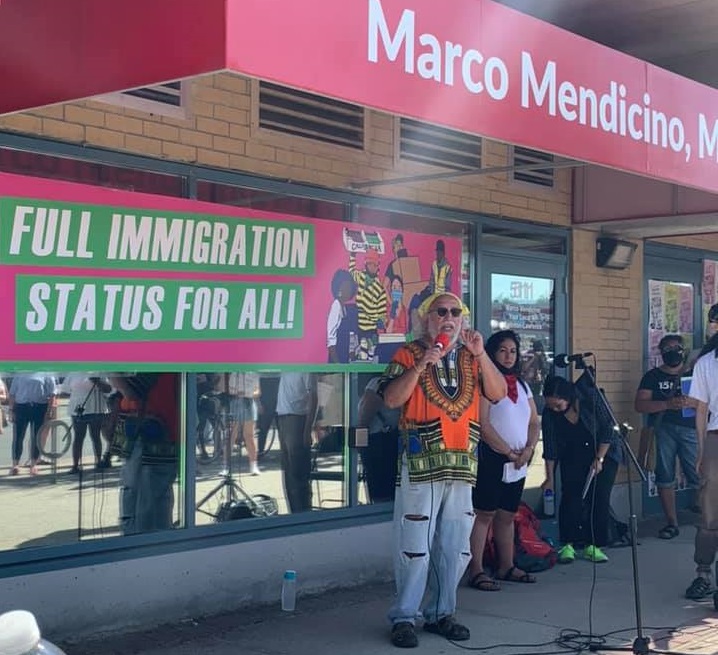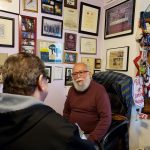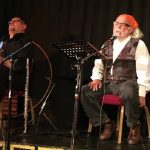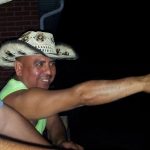
BY OSCAR VIGIL / TORONTO /
Canada is in mourning. Last Friday, at around 3 pm, one of the most outstanding defenders of the rights of immigrants, and particularly the rights of refugees and those without any immigration status in Canada, died: Francisco Rico-Martinez.
The heavens wept that day. We were covered with a mantle of clouds in this city which opened its doors to him and adopted him as a much-loved son over three decades ago when he arrived, looking for asylum, from his native country, El Salvador, where at that time one of the most violent civil wars in the Americas was being fought.
Francisco Rico-Martinez died peacefully in the privacy of his home, comforted by his wife, Loly, his children, Manuel, Ana and Giovanni; his grandchildren; and colleagues and closest friends. His cancer was diagnosed about a year ago and he fought it right up until the last moment because Francisco Rico-Martinez was a fighter, a guerrilla, and a revolutionary who lived his life, fighting for social justice.
Two years after arriving in Toronto as a refugee in 1989, together with his wife Loly, he founded the organization which is called the FCJ Refugee Centre today and began to offer support and services to the thousands of immigrants who year after year arrive in Canada from practically every country. Today this organization is one of the most important of this kind and every year it helps tens of thousands of immigrants, especially refugees and those without immigration status.
Francisco Rico-Martinez was born in the city of Santa Ana, in El Salvador. He was the son of primary school teachers who were actively involved the teachers’ struggles and those of the least privileged in El Salvador. That is where his revolutionary spirit came from.
At university he decided to study law, planning to fight the unjust laws that ruled his country. However, by then he was already involved in this struggle of the revolutionary organizations which were flourishing in El Salvador in the 1970s.
Francisco Rico-Martinez had been a dedicated revolutionary ever since his adolescence, but he always made it clear that he had never used weapons and that he believed in permanent, peaceful revolution, a revolution which tries to transform people and society at the same time, little by little, without any need for violence. And this is what he did, both in El Salvador and Canada, his second homeland.
His decision to participate in the political struggle in El Salvador forced him to leave his country for Mexico where he joined the movements in solidarity with the struggle in El Salvador. There he met again, the one who, from earlier on, had already become the love of his life: Loly.
He sought support for social change in El Salvador in many sectors in Mexico, Nicaragua, Costa Rica and other countries in the Americas and these activities led to him living in Europe for several years, where he became the official representative of Salvadoran revolutionary guerrilla movements that were developing then.
Francisco Rico-Martinez was a dedicated revolutionary who was proud to carry the flag of the Salvadoran struggles, until in 1993, after having seen in person the fighting within the revolutionary left, he became convinced that this type of struggle was not for him. Thus, the permanent and peaceful revolutionary returned to El Salvador with Loly.
On returning to his native country he began to work in the human rights office of the Catholic Church, until, because of his dedicated work in trying to find people who had disappeared or had been assassinated, he was captured by the dreaded security forces and could not be found for several days. Thanks to an intervention by the Church and due to the fact he had a clean record, he was released. He joined the academic world and continued his struggle for change in his country by debating it in public. His revolution continued but with different tactics.
However, full public debate was not possible at that time in El Salvador and once more Francisco and his family were forced to leave El Salvador to save their lives after the murder of the six Jesuit priests on November 16, 1989 at the “Jose Simeon Canas” Central American University in San Salvador.
As a revolutionary, Francisco Rico-Martinez was never a communist or an atheist and the model that he followed was always that of Monseňor Oscar Arnulfo Romero, the Archbishop of San Salvador, who was murdered as he celebrated the Eucharist on March 24, 1980. The now beatified martyr, Saint Oscar Romero became the voice of those who don’t have a voice in Latin America, and in Canada, following his teachings, Francisco Rico-Martinez became one of the most important voices for immigrants.
Intelligent, wise, direct, tough, but patient, and always with a smile, Francisco Rico-Martinez touched the lives of thousands of immigrants during his pilgrimage in this country. During the last days of his illness, hundreds of messages supporting him came from people who thanked him for the help he had provided them with in solving their immigration status in this country. One after another they recounted their stories and wished him the best at this difficult time.
Francisco Rico-Martinez was as strong as an oak, or as a ceiba, as he himself said. The FCJ Refugee Centre of which he was co-director, together with his wife, Loly, has practically become the fundamental resource for refugees and those without status. When all else fails, FJC is there, they say in the streets.
However, they would rather describe this organization as one that this pair of Salvadoran refugees founded with the support of the sisters of the religious congregation, the Faithful Companions of Jesus (FCJ), as a kind of strong ceiba, which is large and leafy, where birds that are fleeing from the violence in their country arrive and are sheltered temporarily, while they find help and a permanent place to live in this country.
Francisco Rico-Martinez’s achievements for immigrants, in Canada and in many other countries in the world, can be seen on thousands of faces, and in stories and in peaceful struggles against injustice in El Salvador, in Canada and wherever traveled.
With his peaceful revolution, Francisco Rico-Martinez tried to change the unjust immigration system in Canada, and he did it from the bottom up, helping the neediest immigrants who arrive here, and also challenging the system directly in speeches, demonstrations, and direct negotiations -most of them difficult- with government officials.
“My home is your home” he was always saying and that was how it was, literally. This was my own experience when I arrived in Toronto with my family in December 2001. Without knowing us at all, Francisco Rico-Martinez invited us to his home to celebrate Christmas and the New Year with his family, and since then we have had many adventures together. In the same way, without exaggerating, thousands of people could tell similar stories.
In recent months, I got together with him from time to time, helping him with one of his last projects, which in the end was not finished. From week to week, the deterioration of his physical condition, the loss of his voice and sometimes the declining state of his health in general was visible. However, right up to the last day the clarity of his mind, his determination to fight against the illness, and the compassion of his soul, were obviously intact. During one of our last conversations when his illness was already quite advanced there was a call on his cell phone from a number that he did not recognize. He answered and it was a woman who needed advice on an immigration case.
He listened to her and helped her, and he had to explain things to her several times and in different ways as it seemed that this woman did not have any understanding of the process. I was getting upset, but he continued calmly explaining to her over and over again what she had to do resolve her situation. That is how he was; always available to help those in need, even when it was in the middle of a meal, or while he was enjoying the weekend. And he always did it with a lot of patience and a smile.
Francisco Rico-Martinez was an exceptional visionary, an indefatigable worker and a good person who would give what he had if someone needed it. However, he also had a temper and when something was wrong, he expressed his opinion strongly That is why, as is said in municipal, provincial and federal political circles, he was feared as much as he was loved, and in the first category obviously there were civil servants who could not change laws or processes for needy immigrants who Francisco Rico-Martinez confronted with revolutionary stoicism.
He was a real leader, a leader of the peaceful revolution in immigration issues in Canada, who led the Canadian Council for Refugees (CCR) at various times and for many years, and in the same way headed various immigration initiatives, both in Canada and in many other countries. He had to negotiate and fight with ministers and bureaucrats. To sum it up, ever since his arrival in Canada, he never put aside the permanent and peaceful revolution that he adopted, and which had influenced his life from his adolescence onwards.
Francisco Rico-Martinez left a gigantic void with his departure. First for his family, and even more so for his wife, his friend and companion in arms: Loly was the love of his life, with whom he fought against the injustice in his own country and with whom he continued the struggle abroad. It was Loly, who was at his side, without resting for a moment during this final struggle, who just requested in his last hours that he be remembered with the smile that he always had, even in the most difficult situations.
However, he is also leaving a gigantic void for those who knew him, those who worked with him, those whom he helped (who number thousands), those who were subjected to his advocacy (who also number thousands) and those who shared the most important moments of his life, including those who shared a shot or two on Ron Zacapa 23 aňos, one of his favourite drinks, with him.
Today Francisco Rico-Martinez is already at peace after a long life of fighting for those who are the neediest and after several difficult months of fighting cancer. However, knowing him as I did, I believe that this is nothing more that a short “break”, a fleeting interval, a brief transformation, a change: since in the place where he is arriving, if everything is not going well, they should no doubt be getting ready because Francisco Rico-Martinez; “Chico Rico” as his friends called him, will continue his peaceful and permanent revolution there.




